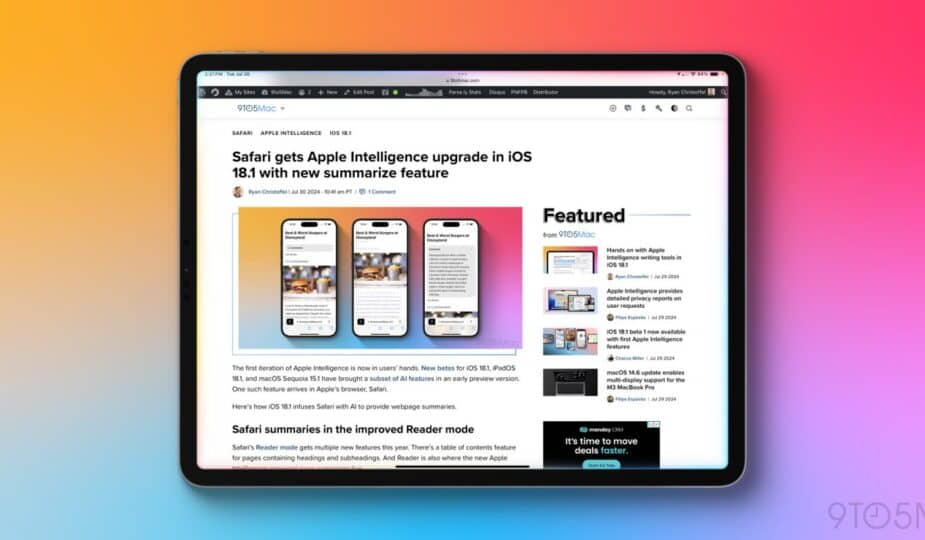
Last week, Apple updated the iPad mini with the A17 Pro chip and support for Apple Intelligence. However, that was the only announcement. The base model iPad was not updated. This was expected, but it is still a little puzzling. The current base model iPad is over two years old, so why is Apple leaving it out of date?
History of the Base Model iPad
Apple introduced what we now call the entry-level iPad in 2017. Although the current model is the 10th generation, the budget nature of the product line began with the 5th generation. After the iPad Air was released in 2013, the iPad 4 was eventually discontinued, creating a large gap between iPad updates.
With the new iPad (5th generation), Apple decided to create a product to serve the masses, especially in education. It stripped away all the extras and stuck to the essentials, skipping the latest chipset, laminated display, and Apple Pencil support. It also had limited storage: just 32GB. However, for $329, it was a great deal.
Apple continued to update this product every year, adding Apple Pencil support and a new chip in the 6th generation, a larger display in the 7th generation, a new chip and fast charging in the 8th generation, and more storage, a faster chip, and a Center Stage camera in the 9th generation.
Then, a year later, we got the biggest update ever to the base model iPad with the 10th generation. It inherited the modern iPad design language, got some fun colors, and switched to USB-C. However, it still stuck to the original formula, keeping the old chipset, non-laminated display, and not supporting the Apple Pencil 2. It still had to use the Apple Pencil 1 through a weird adapter, since the Apple Pencil 1 used Lightning and the iPad 10 used USB-C.
Why Skip an Update?
The current base iPad is over 2 years old. It currently has the A14 chip, which was about 2 years old when it launched. Apple typically puts a 2-year-old chip in the base iPad with each update. And I think that might be the reason for the lack of a new iPad.
Apple probably doesn't want to release a new product without Apple Intelligence since they've made it such a big part of all the marketing for new products. If history is any guide, the current iPad 11 update will have an A16 chip, which is incompatible with Apple Intelligence.
Sure, they could fit it with an A16 chip and 8GB of RAM, but I doubt Apple would want to optimize Apple Intelligence for even cheaper hardware, especially if it was only for one device.
With the iPad's current price of $349, it's unlikely that Apple would be able to fit a newer chipset than the A16 into the device. Plus, with the iPad mini 7 using the A17 Pro instead of the A18, it seems like Apple doesn't want to push too much of the second-generation 3nm process, which likely has limited power. Putting the latest chip in their cheapest product isn't viable.
I think that, all things considered, an update to the base model iPad with Apple Intelligence would be unlikely to happen this year, making it the second year in a row that Apple hasn't updated its most popular iPad.
iPad 11 Release Date
With all this context in mind, you might be wondering: when will they actually update the base model iPad? We were originally expecting it in the fall, but that never happened. Display specialist Ross Young then said that panels started shipping this month, suggesting a spring release. However, Bloomberg's Mark Gurman is less optimistic in his timing:
The iPhone SE will get these features in March, and the entry-level iPad will likely get an update later this year.
So we're potentially looking at a fall 2025 refresh. By then, the iPhone 17 will already be out, making room for Apple's most popular product to use the older A18 chip from the iPhone 16. This would allow Apple Intelligence, although it would be a bit odd for the base iPad to have a better chip than the iPad mini, so maybe they'll make it another refresh next fall.
The iPad mini uses leftover A17 Pro chips from iPhone 15 Pro production anyway, so supplies are limited. They'll likely refresh the iPad mini as soon as they need to. Given that the base iPad is significantly larger in volume than the iPad mini, I can't imagine it will follow the same A17 Pro strategy.
To sum it up
Overall, it seems likely that Apple skipped updating the base iPad because the lack of Apple Intelligence would probably be bad for the optics. Either way, according to Mark Gurman, we won't get an update until late 2025, meaning Apple will be selling a 3-year-old product with a 5-year-old chipset when it finally gets an update.
That's pretty worrisome for long-term software support, but that's apparently our reality. At the same time, Apple will enjoy additional iPad Air sales from customers who value the Apple Intelligence feature set but want to stay within their budget.
What do you think about Apple seemingly betting on Apple Intelligence? Let us know in the comments.
Follow Michael: X/Twitter, Threads, Instagram









